We have watched the music industry slowly change over the past fifteen years from hard copies of albums to digital songs sold individually for a low price point, and now the industry has moved into subscription services, the most popular of which is Spotify. For those who wish to consume books in audio format, many offerings within the US are simply not serving consumers in the most desirable way.
While Audible has a slightly better selection of books and obtains new works at a higher volume, the format of Audible only allows subscribers a limited number of books to listen to through its NFTs. Users obtain access to a large number of free books, but most new releases and highly-desired audiobooks are only obtainable through the Audible credit system, where users gain one credit per month of paid subscription. Because books can cost between one and three credits, the amount of newly released audiobooks available for the basic subscription is still quite limited.
Many avid audiobook readers are now moving to Scribd, a site that functions similarly to the Spotify model. Scribd is roughly the same monthly cost, but you have the ability to listen to audiobooks or read ebooks at a mostly unlimited capacity. Scribd has been compared to Netflix in that it may not have every new book as it hits the market, but it offers a great variety for the voracious audiobook consumer at a better price point than Audible.
If audiobooks are so popular, why are they not offered in a similar capacity to the digital music industry by the largest US retailer and producer of audiobooks? While there are costs involved in the production of audiobooks that are time-consuming, the audiobook market is clearly approaching the same issue that the digital music industry faced during the time of illegal downloading services like Napster and Limewire. The hesitancy towards moving to a more open model of consumption is creating piracy issues that are infinitely more destructive to the industry than an overhaul of the current model.
Audible is also guilty of damaging the industry through its “Audible Exclusive” program (also referred to as “Audible Originals”), in which it obtains the rights to certain audiobooks and makes them only available through the Audible program. This means that libraries are unable to obtain copies of these audio manuscripts for the public, which is an excruciating blow to the accessibility that libraries and book programs across the US attempt to maintain. The monopoly of manuscripts for profit is not a new phenomenon, but it is a bleak one that doesn’t bode well for the industry at large.
As the Amazon problem grows larger and larger, we see it slowly taking steps at monopolizing art and literature, often at the expense of both authors and consumers. As Scribd continues to grow, there is hope that other options for avid audiobook consumers will continue popping up and that the accessibility of literacy that is so inherent to the audiobook format will remain easy to obtain for everyone.

